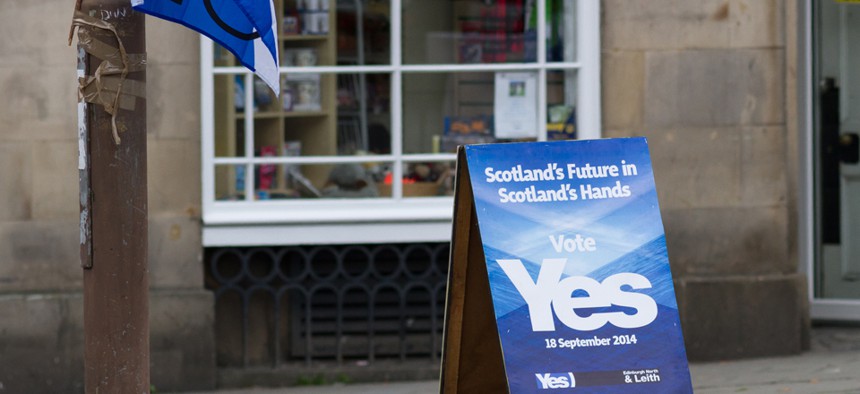Lessons Learned: U.S. Secessionist Groups Reflect on the Scottish Referendum

Krizek Vaclav/Shutterstock.com

Connecting state and local government leaders
Far from discouraged, some groups are excited by the momentum generated by Scotland’s independence movement. Others smell conspiracy overseas.
Scottish voters on Thursday chose to keep Scotland a part of the United Kingdom in a referendum on independence. Before the vote, independence movements in the U.S. looked to the Scottish secession campaign for inspiration—now, in the aftermath of the failed secession, the same groups are considering the lessons they can learn from Scotland's experience.
Despite the ten percent margin between the no and yes votes, some independence movements stateside are far from disappointed. "This development should encourage other nationalist and independence movements in Europe, America, and elsewhere to keep on pushing toward their goals," said Michael Hill, president of the League of the South, a secessionist movement that advocates for a "free and independent Southern republic." The Southern Poverty Law Centerdesignates the League of the South as a neo-Confederate hate group.
The mere fact that Scottish voters were given the power to decide their own fate at the ballot box is what excites some of these groups. That the independence campaign made pro-union politicians extremely jumpy in the lead-up to the vote as they made significant gains in the polls is only icing on the cake.
"The Scots have proved to the world that 'secession' is a legitimate and viable political option for smaller states enmeshed in larger imperial realities to consider," Rob Williams, publisher of anindependent-minded online journal about Vermont, wrote in a statement.
Further, the astonishingly high turnout rates—84.5 percent of eligible Scottish voters cast a ballot on Thursday, and some areas saw a turnout of more than 90 percent—are encouraging to Williams. These numbers are "clear evidence of the secession debate's ability to galvanize sustained national conversation about Scotland's future," he wrote. "And, despite Westminster's long list of concessions, the world can rest assured that the secession conversation in Scotland will not disappear."
But for one group, the results in Scotland smack of conspiracy. "The Scottish folks have been tricked by a semblance of a 'democratic vote,'" said Robert Wilson, a senator of the Republic of Texas, a group that advocates for Texan independence by running an "interim government" in the state. "By most reports, huge expenditures were made by U.K. leaders to influence the vote, ultimately paid for by excessive taxation of Scottish voters," Wilson said. "The international elites are very experienced at faking democracy while using massive propaganda campaigns to control their empires."
Wilson used the example of Scotland's referendum to advocate for local government. A government closest to your neighborhood is the only government you can trust," he said. "Let us govern ourselves, locally, where those elected can be held accountable immediately."
He says the Republic of Texas has nothing to learn from Scotland's referendum. "We already knew a 'popular vote' is fruitless and foolish; Scotland simply confirms that. They were sucker-punched," he said. "So we have a strategy that avoids that, and has already succeeded numerous times. But like the Dallas Cowboys, we don't tell our game strategy in advance."
The American secessionist groups said that they would not back down because of Scotland's vote to stay a part of the U.K. on Thursday. "This is no time for quitting the cause; it is indeed time for all who support devolution, independence, and the breakup of empires to redouble their efforts," Hill said. And Williams was just as adamant about his movement in the Northeast: "Looking ahead, we're rolling up our sleeves here in the Green Mountains—the secession conversation is alive and well here in the once-and-future Vermont republic."
Wilson says the Republic of Texas is similarly undeterred. "We intend to win independence without violence, lawfully, but not by repeating the errors of the past," he said. "There is a new zeitgeist which few understand yet, and it is heavily in our favor."
(Image via Krizek Vaclav / Shutterstock.com)
NEXT STORY: New Jersey Mayor: ‘I Don’t Have a Butt Patrol’





